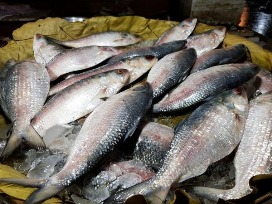Indo-Bangla diplomacy hinges on hilsa
SUBHASHIS MITTRA - Wide Angle
Hilsa enjoys the pride of place when it comes to Indo-Bangla diplomacy. It dominates bilateral talks between the two neighbours, in lighter vein and even otherwise.
Since Bengalis have a special liking for this mouthwatering variety of fish, ‘Hilsa Diplomacy’ was introduced long time back and is still in vogue.
Bangladesh Prime Minister Sheikh Hasina uses ‘hilsa diplomacy’ to bridge the relationship between the two countries. She first used the hilsa gift for the then West Bengal Chief Minister Jyoti Basu in 1996 before the signing of the Ganges Water Sharing Agreement between Bangladesh and India.
Then, when Mamata Banerjee was India’s railway minister in 2010, Hasina brought hilsa fish for her. When Banerjee became Chief Minister of West Bengal in 2016, that time too Hasina sent her 20 kg of hilsa.
In 2017, she took 20 kg of hilsa and other gifts for then Indian President Pranab Mukherjee. It was hoped at that time that the deadlock over Teesta water distribution could be overcome, thanks to the special gift.
Bangladesh is the largest producer of hilsa. They make good profit by exporting this fish to India.
When Bangladesh Commerce Minister Tipu Munshi visited India this year, Banerjee had urged him to request PM Hasina to send hilsa fish to India this festive season in September-October.
Soon came the good news for Bengal food connoisseurs. A huge consignment of their favourite silvery delight came from Bangladesh at Howrah wholesale market on the outskirts of Kolkata, the capital of the eastern metropolis.
Much to the chagrin of food lovers in West Bengal, Bangladesh had banned hilsa export to India in July 2012. Later, as a token of goodwill, the neighbouring country lifted the ban during Durga Puja in 2019.
This time, the availability of hilsa fish was quite good during the Durga Puja festivities.
A piece of hilsa is enough for a Bengali platter. The taste of hilsa found in Bangladesh, especially from river Padma, is classic and as a result, its demand is also high.
Hilsa-loving Bengalis are divided into two Bengals. This geographical separation was created through partition in 1947. Due to the partition of India, Bengalis of Bangladesh and Bengalis of West Bengal are living in two separate lands.
Hilsa is extracted mainly in Bangladesh, which is at the top of 11 countries producing this fish. About 86 per cent of the world’s hilsa is harvested in Bangladesh. In the financial year 2019-20, 5.5 lakh tons have been fished. The Bengalis on the other side of the Padma, therefore, look to this side for hilsa.
Many of the Bengalis of West Bengal were born in the territory of Bangladesh. The taste of hilsa eaten in childhood still remains in their palate. The demand for this fish is also high in certain other states like Tripura, Assam and Odisha.
Though there are other hilsa-exporting countries like Myanmar, Indonesia, Iran, Malaysia, Pakistan, and Thailand, the
variety procured from Bangladesh is considered to be of the best quality.
The fish stocks reach West Bengal through the Benapole-Petrapole border, which is India and Bangladesh’s primary border crossing, both in terms of cargo and passenger movements, but a challenge arises for the Hasina government with regard to the illegal smuggling of the popular fish variety. This is because of a huge demand-supply gap in hilsa fish stocks through the porous border area.
During Prime Minister Hasina’s latest visit to India, Teesta river water was a significant issue. The river, which flows between India and Bangladesh, is very important to Dhaka. Bangladesh has been trying for many years to ensure a fair share of the water of this international river. Hasina resumed her efforts in this visit as well and adopted the hilsa path once again. Give us Teesta water, we will give you hilsa in return, was her refrain – now oft repeated.
Hilsa fish, therefore, stands on an equal footing if not on a higher pedestal alongside important issues between India and Bangladesh – and river Teesta is a glaring example.
